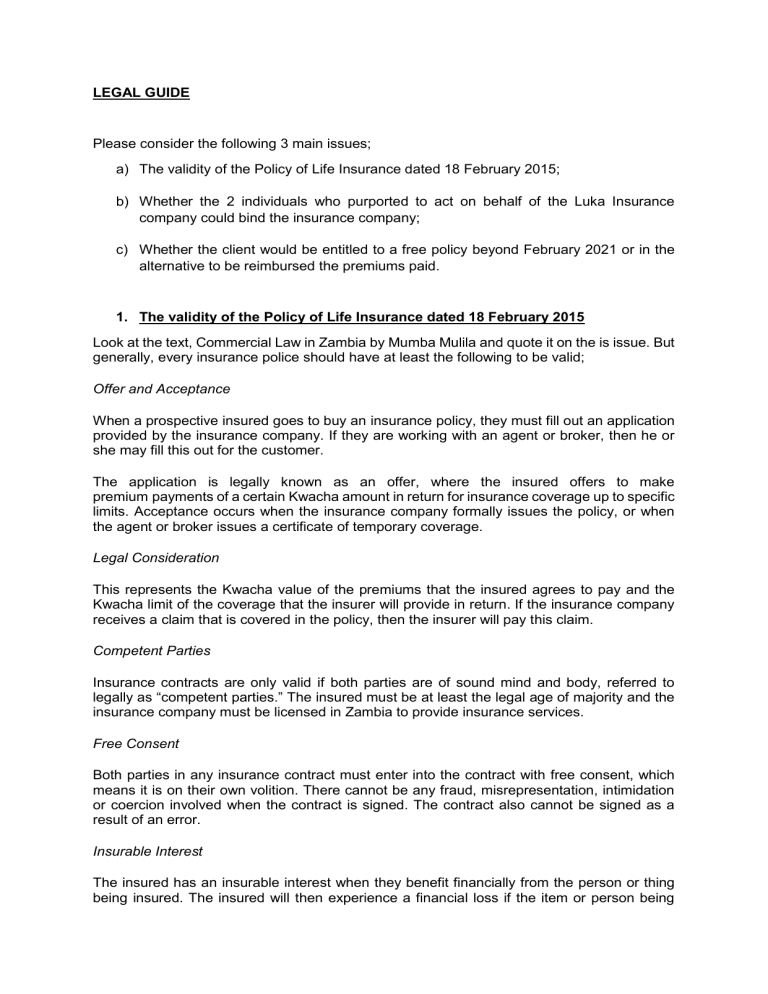
LEGAL GUIDE Please consider the following 3 main issues; a) The validity of the Policy of Life Insurance dated 18 February 2015; b) Whether the 2 individuals who purported to act on behalf of the Luka Insurance company could bind the insurance company; c) Whether the client would be entitled to a free policy beyond February 2021 or in the alternative to be reimbursed the premiums paid. 1. The validity of the Policy of Life Insurance dated 18 February 2015 Look at the text, Commercial Law in Zambia by Mumba Mulila and quote it on the is issue. But generally, every insurance police should have at least the following to be valid; Offer and Acceptance When a prospective insured goes to buy an insurance policy, they must fill out an application provided by the insurance company. If they are working with an agent or broker, then he or she may fill this out for the customer. The application is legally known as an offer, where the insured offers to make premium payments of a certain Kwacha amount in return for insurance coverage up to specific limits. Acceptance occurs when the insurance company formally issues the policy, or when the agent or broker issues a certificate of temporary coverage. Legal Consideration This represents the Kwacha value of the premiums that the insured agrees to pay and the Kwacha limit of the coverage that the insurer will provide in return. If the insurance company receives a claim that is covered in the policy, then the insurer will pay this claim. Competent Parties Insurance contracts are only valid if both parties are of sound mind and body, referred to legally as “competent parties.” The insured must be at least the legal age of majority and the insurance company must be licensed in Zambia to provide insurance services. Free Consent Both parties in any insurance contract must enter into the contract with free consent, which means it is on their own volition. There cannot be any fraud, misrepresentation, intimidation or coercion involved when the contract is signed. The contract also cannot be signed as a result of an error. Insurable Interest The insured has an insurable interest when they benefit financially from the person or thing being insured. The insured will then experience a financial loss if the item or person being insured either dies or is damaged or lost. Prospective insureds cannot get coverage on something in which they have no insurance interest. CONCLUSION: you will qualify the contract as having been validly entered into as there is nothing from the facts to suggest otherwise. Be sure to include case law. 2. Whether the 2 individuals who purported to act on behalf of the Luka Insurance company could bind the insurance company - Look at the issue of authority of an agent. An agent can only bind a principal if he/she was clothed with authority by the principle. In the absence of authority, no agent can bind another. Look at both ACTUAL and OSTENSIBLE authority. There are several cases on this. 3. Whether the client would be entitled to a free policy beyond February 2021 or in the alternative to be reimbursed the premiums paid. A Note on premium It is not necessary for premium actually to be paid - the contract may provide that the consideration is agreement to pay. Generally, requirements for payment of premium will be governed by the terms of the contract of insurance. Effect of payment of premium to broker - A broker who is engaged by the insured has no authority from the insurer to collect premium, so payment to the broker will not constitute payment to the insurer, as a matter of English agency law (MacGillivray on Insurance Law, 12th edition 7-007). However even where it is otherwise the agent of the insured, the broker may be held out by the insurer as authorised to accept premiums. Consequences of late payment of premium - An insurance contract may contain a premium warranty under which the insured warrants that premiums will be paid at given times. Such a provision will be given effect by the court as a warranty and default will bring the insurer's liability under the policy to an end, although the insured remains liable for the premium (J A Chapman & Co Limited v Kadirga Denizcilik Ve Ticaret [1998] Lloyd's rep IR 377). Even without an express warranty an insurer may be able to repudiate a contract of insurance where there has been a failure to pay premium on the due date. Figre Limited v Mander [1999] Lloyd's Rep IR 193 is Commercial Court authority that an insurer could repudiate if: (a) time was stipulated to be of the essence; (b) circumstances of the contract or the nature of the subject matter showed that time was impliedly of the essence; or (c) where time was neither expressly nor impliedly of the essence, but the insured had been guilty of unreasonable delay, and the insurer had given notice requiring the premium to be paid within a reasonable time. Broker's liability to insurer for premium - In the marine insurance market, the placing broker is directly responsible as principal to the underwriter for payment of premium pursuant to Section 53 (1) Marine Insurance Act 1906, which codified a long-standing market practice to this effect. The rule is said to reflect a legal fiction whereby, when the contract is concluded, the broker is deemed to have paid the premium and the insurer is deemed to have loaned the premium money back to the broker. Where the practice codified in Section 53(1) applies, the insurer will be unable to claim premium direct from the insured (Universo Insurance Co of Milan v Merchants Marine Insurance Co Limited [1897] 2QB 93). Because the broker is directly liable to the insurer for the premium as soon as it falls due, the broker has a corresponding right to an indemnity from the insured. The broker can sue the policy holder to recover the premium even if it has not made any payment to the insurer itself (J A Chapman & Co Limited v Kadirga Denizcilik Ve Ticaret). On fraudulent misrepresentations by broker, look at the attached article Conclusions; Client should be entitled to a free policy beyond Feb 2021. Tis is because she laced reliance on the representations by the agents. In fact, Mr Coward, Luka Insurance Company district superintendent had ostensible authority to bind the insurance Company ; or In the alternative, should be entitled to a refund of the premiums in the event she wants to terminate the policy. This would not be a good option or possible if she wants to continue with the policy.

